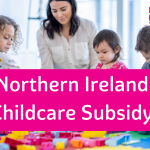New briefing on tackling disadvantage through childcare launched at Stormont
Joint briefing from Employers For Childcare and JRF looks at the role of childcare in lifting families out of poverty.
Employers For Childcare, together with Joseph Rowntree Foundation (JRF) has launched an important new briefing paper at an event which took place in the Long Gallery at Parliament Buildings, Stormont on Thursday 11 January 2024. The event was sponsored by MLAs Nicola Brogan (Sinn Féin), Kate Nicholl (Alliance), Diane Dodds (DUP), Robbie Butler (UUP) and Sineád McLaughlin (SDLP).
The new briefing highlights that while quality, affordable early learning and childcare is key to lifting families out of poverty and giving children the best start in life, at present, the system in Northern Ireland is letting families down and not achieving its potential to tackle disadvantage. The briefing makes a number of recommendations aimed at tackling disadvantage through early learning and childcare to inform Northern Ireland’s new Early Learning and Childcare Strategy, which is currently in development.
The launch was attended by over 60 key stakeholders from across the childcare and early education sector as well as those with a wider interest in issues around poverty and child development. This included elected representatives, senior government officials – including from the Department of Education team tasked with taking forward work on the new Strategy – charities, childcare and early years practitioners, academics, business organisations and others. Guests were welcomed by Nicola Brogan, MLA, Chair of the Assembly’s All Party Group on Early Education and Childcare, and Diane Dodds, Vice Chair.
Addressing the event, Louise Woodruff from Joseph Rowntree Foundation provided an overview of JRF’s broader work to reduce poverty, including a May 2023 report produced by Coram Institute in partnership with JRF, outlining proposals for a new childcare system in England to tackle disadvantage, based on five building blocks:
- Affordable
- Quality
- Accessed
- Family-focused
- Integrated.
The briefing produced by Employers For Childcare in partnership with JRF offers a Northern Ireland approach to this issue and is part of wider work ongoing across each of the devolved nations.
Aoife Hamilton from Employers For Childcare then shared a presentation outlining the findings from the new briefing. She set out the challenges facing families and providers in Northern Ireland, and the report’s finding that the system here is not delivering as it should against each of the five building blocks of a childcare system that tackles disadvantage, listed above. Aoife presented proposals on how investing in a new model of integrated early education and childcare can deliver significant benefits for parents, children and our vital early learning and childcare sector.
Both Louise and Aoife reflected on the importance of learning from the experience in England in developing proposals. In England, while record investment is being made into the childcare sector, issues with the targeting of the investment risk entrenching, rather than tackling, disadvantage.
The key recommendations outlined in the report include:
- A bespoke funding model for the sector to better meet the needs of all families, incorporating:
- Universal, free provision of 22.5 hours of early learning and childcare for children in their immediate pre-school year.
- A core-funding subsidy for all registered childcare providers covering a portion of their costs of delivering quality early education and childcare, enabling them to reduce the fees they charge parents. The subsidy should be increased over time, as public finances allow, further reducing fees for parents.
- A strengthening of the support aimed specifically at tackling disadvantage, including targeted subsidies for providers and expansion of Sure Start services.
- New legislation to establish a statutory basis for the financing, supervision and coordination of the delivery of early learning and childcare services, together with a clear sufficiency duty.
- A Workforce Strategy for the sector informed through a meaningful review of childcare regulations and standards.
Following Aoife’s presentation, guests heard from MLAs representing the five main political parties. MLAs Nicola Brogan (Sinn Féin), Kate Nicholl (Alliance), Robbie Butler (UUP), Diane Forsythe (DUP) and Sinéad McLaughlin (SDLP) each responded to the report’s findings and shared their views on the role of early learning and childcare in tackling disadvantage. Each reflected on the significance of this issue to them and to their party, and there was a strong message that it will be a day one priority for a restored Assembly.
This was followed by a powerful presentation from Sue Pentel of the Northern Ireland Community Daycare Network who provided a view from the sector. Sue set out the importance of a community based, family-centred approach in helping to support children and parents right across Northern Ireland. She shared examples of how community based daycare services, embedded within community organisations, operate in areas of high deprivation and are supporting families practically including through initiatives such as food parcels, clothing drives, a social supermarket, benefits advice and fully funded childcare provision. Case studies brought to life the impact these services have had on families, and informed key asks for long-term investment, building on existing infrastructure, that puts the child at the heart. The event closed with an insightful question and discussion session.
Speaking following the event, Aoife Hamilton, Employers For Childcare, said: “Quality, affordable early education and childcare plays an essential role in tackling disadvantage by enabling parents to work and helping give children and young people the best start in life. However, inadequate investment, and a lack of progress over many years, means that the system in Northern Ireland is failing parents, providers and children – and entrenching disadvantage. This cannot continue, and a new Executive must address this issue as a day one priority identifying the ambitious funding that is needed.
The recommendations in the briefing we have launched today are designed to inform ongoing work to develop options for the new Early Learning and Childcare Strategy. While further work is needed to advance the proposals, they offer a starting point from which to engage collaboratively across the sector to co-design an early learning and childcare system that achieves its greatest potential for families, our economy and wider society.
We would like to thank everyone who contributed to the development of this new report, and who attended the launch. The constructive engagement at today’s event gives a renewed optimism that we can deliver a world-leading early learning and childcare infrastructure for Northern Ireland. We hope that our briefing, delivered in partnership with JRF, will play a role in helping to achieve this.”
Louise Woodruff, JRF, said: “A well designed and functioning childcare system can be a key tool to tackling disadvantage. It can prevent disadvantaged children falling behind before they even start school and help address child poverty by supporting parents to work. Families deserve childcare that’s high quality, affordable and easy to access. A childcare system that works doesn’t just help parents, it improves our economy, our communities and our society. This new report looks at the policy change needed in Northern Ireland to deliver on this ambition.”
The briefing and a presentation shared at the event are available to download from the top right of this page. For further information contact Aoife Hamilton strategy@employersforchildcare.org.






